How useful is your self talk?
Some years ago I was lucky enough to spend time taking groups of people to PNG, on leadership programs; working with them to test themselves against the backdrop of mud, mountains, rain, leeches, going steeply up and coming steeply down. Never a breeze. Never ‘ho hum’.
Who would be the people to get through pretty easily? The youngest and fittest? You might think so. But there is another dynamic happening when we do something that is really tough.
Having watched many people tackle this challenge, it was clear that everyone finds it hard. Everyone. Talking to them as they go along they disclose fear, self-doubt, physical and emotional pain – in varying amounts, at different times. But from the outside, what can you see?
Usually, a pretty nondescript expression, or a weak fixed smile. And to the outside untrained eye, this often translates to ‘I’m ok’. So while the person is tackling their inner demons and may be screaming in anguish on the inside, all their travelling companions see is ‘I’m fine’.
What do they do with this interpretation?
Often, they compare it to how they are feeling themselves, and the demons they are working to overcome. Not surprisingly, this often makes them feel worse.
"We can excel at feeling bad when we continually compare other people's show reel to our bloopers tape." - Unknown.
So the fit and healthy person, doing it tough, observes the heavy smoker who is carrying more than a little extra weigh, looking ‘fresh as a daisy’. And it can really mess with their thinking.
“How can I be in trouble here?” “How can he be doing it so easy?” “This is too tough for me.” “Wow – I might not be able to cope!” “What am I going to do?”
The other guy, who by all accounts really should be struggling, is still moving forwards. One foot in front of the other. He is still looking calm. How is he doing it so easy?
Well, he’s not. You can’t see someone else’s thinking; you can only see what is visible. He is most likely fighting with his thinking at every step. But this is a personal conversation which doesn’t show on his face. It is all taking place within his self-talk.
We are all in on-going conversations with ourselves that affect how we think and feel on a moment by moment basis. It’s an extremely important conversation that contributes to how we decide what we are capable of and where we might invest our energies. On the Track, it was potent.
How conscious are you about yours?
Are you interested, encouraging and useful in your self-talk? Self-critical, judgemental, harsh? Do you continually judge yourself against your perception of others? If so, are you even conscious that your interpretation may be false (as in the Kokoda example of ‘everyone else is doing well while I am about to die’)? Are you supportive? Damaging? Somewhere in between? Never really thought about it?
Our self-talk is sometimes called the ‘inner critic’. And for good reason … because often that is exactly what it is doing. Criticising.
The good news is that self-talk it just another habit. And with practice we can change it.
Try testing out your perceptions to get a more accurate evaluation. If you aren’t feeling resourceful, can you find more useful things to focus on? Bring to mind examples of success to lift your confidence. In the jungle, you can look around you for the awe rather than focusing on the mud. Some people forget that what you focus on expands – and that it is your choice.
Kokoda is an amazing place. As well as the mud, it is also a place of laughter, friendship, wonder, inspiration, reflection, self-understanding, satisfaction, exhilaration. The good old belly laugh and the amazing sense of pride from finding something that just couldn’t be done, and doing it anyway. An experience to last a lifetime.
Author: Nicola Deakin

